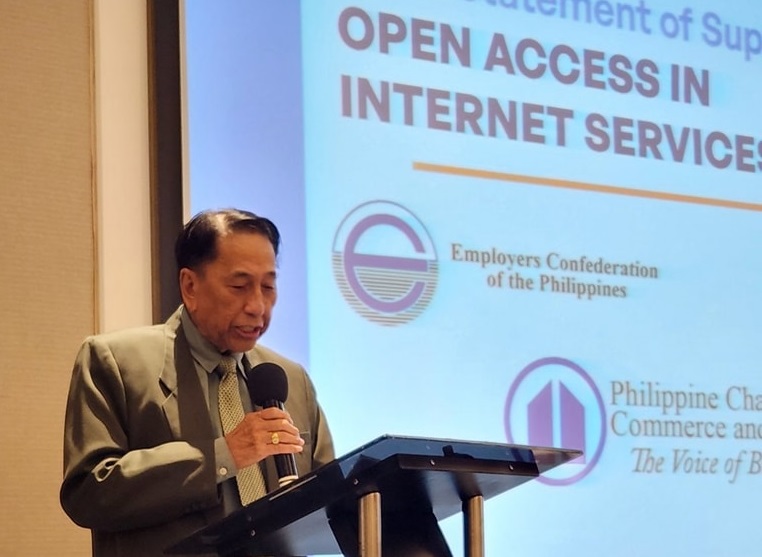Three major business groups have called on the Senate to fast-track the approval of the proposed Open Access in Internet Services Act.
The Employers Confederation of the Philippines (ECOP), Philippine Chamber of Commerce and Industry (PCCI), and Philippine Exporters Confederation (PhilExport) signed a joint statement declaring full support for the immediate enactment of the proposed Open Access in Internet Services Act (OAIS Act).
The business groups stated that the Open Access bill will address the legal obstacles and binding constraints which have long stifled the growth of the Philippine Internet industry in a world increasingly reliant on connectivity to function and advance.
“Poor and unreliable access and unaffordable Internet services persist,” according to the statement, warning that not addressing the major challenges in Internet access and affordability will lead to digital exclusion, with steep consequences in terms of attempts to improve education, finance, e-governance, e-commerce, and health in the country.
Citing the Department of ICT’s 2019 survey, the statement said only 47% of Filipinos were found using the Internet and 18% of households subscribed to the Internet when the Covid-19 pandemic struck.
At the height of mobility restrictions, an education department survey revealed that 52% of public schools and 83% of their enrollees were unable to go online for classes.
The groups also voiced alarm about the growing broadband infrastructure gap, with remote rural areas being the most disadvantaged.
The World Data Lab found that among the Asean countries, the Philippines has the second highest number of mobile data unaffordable, while data from the Alliance for Affordable Internet had the Philippines recording the second lowest affordability score in the region in 2021.
Philippine mobile broadband was about 40% slower than the median speed of its Asean peers, according to Ookla data for March 2023, although Philippine fixed or wired broadband was doing slightly better.
“Moving forward, the digital divide threatens to undermine our economic growth, and must be addressed for the government’s push for e-governance to truly succeed,” said Better Internet PH lead advocate Mary Grace Mirandilla-Santos in a statement of support.
For his part, PhilExport president Sergio Ortiz-Luis Jr., who signed the joint statement on behalf of ECOP, PCCI, and PhilExport, noted the widening digital divide which deprived Filipinos of equal opportunities.
“Promoting the development of existing infrastructure through immediate enactment of the proposed Open Access in Internet Services Act is a step towards paving the way for transformative advancement. Every Filipino must be given the opportunity to participate in the digital environment,” said Ortiz-Luis.
The OAIS bill contains two key reforms that will address the legal obstacles and outdated laws that put up high barriers to entry and perpetuate a costly and inefficient way of installing broadband infrastructure.
One of these reforms seeks to lower the barriers and cost to market entry of Internet network operators by simplifying the registration and qualification process for providers.
Another reform is to make broadband network deployment faster and more efficient by promoting infrastructure sharing and streamlining the approval process for permits to install broadband infrastructure.
Joining the business groups and Better Internet PH in signing the manifesto were the Internet Society Philippines Chapter, Fintech Alliance.PH, Philippine Cable Television Association, National ICT Confederation of the Philippines, Foundation for Media Alternatives, and Democracy.Net.PH.
These groups also affirmed their support for the OAIS bill, stressing that open access to the Internet is a fundamental right of all Filipinos regardless of where they live.




